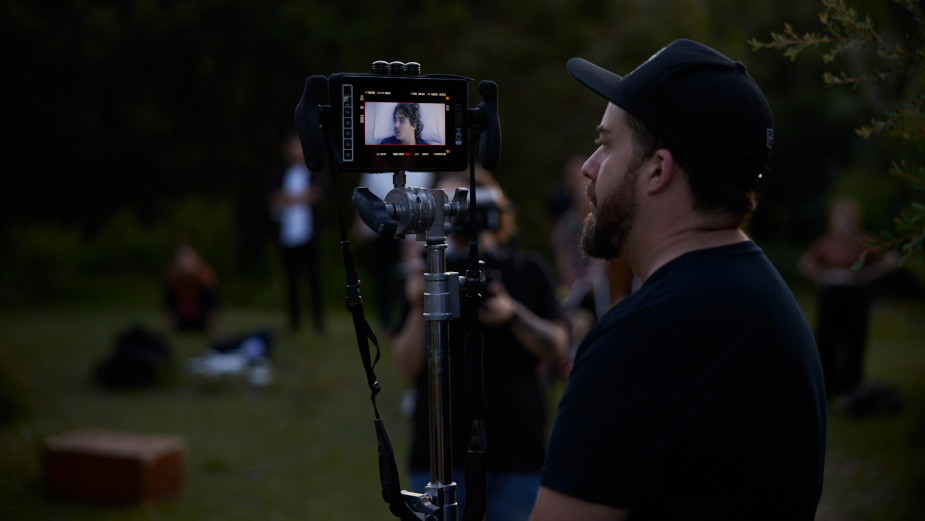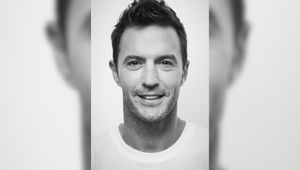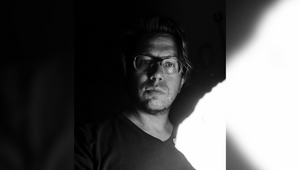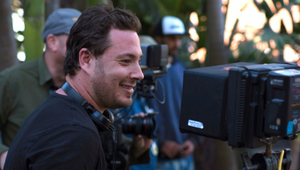
The Directors: Zac Lynch-Woodlock

Zac Lynch-Woodlock has a strong passion for storytelling, and an even stronger desire to find quirkiness in the day-to-day situations which those stories reflect. He loves to explore bold, comedic characters who are layered with nuance and depth, whilst also aiming to create visually engaging and alarming imagery. Zac always has a strong desire to creatively elevate work - finding ways to give each campaign or project a unique “hook” that keeps an audience engaged.
Coming from a long background in production and agency work, Zac has allowed him to develop a firm understanding of the filmmaking process, and a strong ability to successfully transfer a concept from a page to the screen.
Name: Zac Lynch-Woodlock
Location: Newtown, Sydney, NSW
Repped by/in: I work freelance with a number of production companies. Most recently I completed a campaign with Found At Sea for their client Brickworks.
Awards: A few over the years, but most recently won Best Music Video at the Greenscreen Film Fest for Birds Of Tokyo’s single ‘Superglue’.
LBB> If the script is for a brand that you're not familiar with/don’t have a big affinity with, or a market you're new to, how important is it for you to do research and understand that strategic and contextual side of the ad? If it’s important to you, how do you do it?
Zac> If it’s a campaign for a brand that I’m unfamiliar with, then I’ll do some research to get an understanding of their tone of voice in the market. In most cases, the script has been developed by the planners and creatives and an insight that’s been identified about the product or the customer.
Mostly, my role as a director is to interpret the script and get an understanding of the particular insight and then come back with a director’s treatment, in which I will outline my approach and show that I have a firm understanding of who they are as a brand and how they want to appear in the market.
Also, quite often as a director you are focused on the storytelling and bringing the creative insight to life, whereas the agency and client will be focused on the tone of voice and the brand messaging, so they will always be there to help keep it on brand.
LBB> For you, what is the most important working relationship for a director to have with another person in making an ad? And why?
Zac> There are a lot of key relationships throughout the course of a production that you must try to foster as a director. In pre-production, the relationship with your production team is crucial to ensure that everything is being brought
together as you had imagined it. During the shoot, your relationships with the crew and the performers are crucial to make sure that everything is being captured as you had planned. Then in post-production, your relationships with the post team are of great importance- making sure that everything is being crafted with the utmost care for the final output.
Overall though, throughout the whole production process, it’s crucial that you are communicating effectively with your producer, the creative team and the client to make sure that everyone is on the same journey, and that they will be happy with the eventual outcome.
LBB> What type of work are you most passionate about? Is there a particular genre or subject matter or style you are most drawn to?
Zac> I’m drawn to a variety of genres when it comes to advertising. Ultimately, to be able to create different worlds with a myriad of characters that don’t really need to have an obvious backstory or context to exist is an exciting space to work in.
I’m particularly drawn to situational comedy, and therefore I really enjoy working on comedic campaigns where the ideas can be stretched so much further because reality and common sense can be abandoned.
Overall, I’m pretty excited about the direction advertising is heading in at the moment, especially seeing that visual craft is at the forefront of so many campaigns.
LBB> What misconception about you or your work do you most often encounter, and why is it wrong?
Zac> As a commercial director you tend to get pigeonholed into having a strength for directing certain genres. I personally have found that my commercial reel has developed into a comedy performance body of work. This has sometimes led to the misconception that I mainly/only work on comedic campaigns.
I personally like to be quite versatile in my work and allow the brief to dictate how I approach it as a director.
LBB> Have you ever worked with a cost consultant, and if so, how have your experiences been?
Zac> I’ve never actually worked with one, but I understand they are responsible for a lot of the belt tightening that has taken place within the industry over the years. I just hope that the right belts are being tightened, allowing the money to be put onto the screen.
LBB> What’s the craziest problem you’ve come across in the course of a production – and how did you solve it?
Zac> As a director, listening and observing is key, and you have to understand the needs of each department. Over the course of my career in the film industry, from starting as a Runner when I was 21 years old, all the way to now as a director, I’ve encountered numerous crazy situations that needed to be dealt with.
One of the most bizarre situations I had to deal with was when the set builder failed to arrive with the set. I was the director on the shoot and my previous art department experience on film sets kicked in pretty quickly. I located several ‘flats’ and physically put them together and built the set. I don’t think the client ever realised.
So ultimately, always keep an open mind as to how a production might develop, and don’t let yourself become overwhelmed when you meet hurdles along the way.
LBB> How do you strike the balance between being open/collaborative with the agency and brand client while also protecting the idea?
Zac> You need to be very clear what your vision is for the project when going into a production with the agency and client. Generally, the creative teams have been working on a project for several months and they need you to be the champion for their creative idea and bring it to life and help carry it over the finish line.
Things will undoubtedly take place during the production that will require you to make compromises on that vision. When this happens, you need to be honest and open with the agency or client about these compromises to make sure you are still on the same page creatively. Quite often ‘happy’ mistakes can happen, where you discover something that was never a part of anyone’s vision. You need to be open to these in order to allow the film to develop and take on a life of its own, rather than desperately trying to shield it from any outside input. As the director, however, you still need to act as a filter for any input and make sure that only the best ideas are making the final cut.
LBB> What are your thoughts on opening up the production world to a more diverse pool of talent? Are you open to mentoring and apprenticeships on set?
Zac> The best way for anyone to get into film is for them to be recommended by someone. My first role in the industry came through a high school friend who brought me on as a runner, and then years later my first commercial directing job came about when I was recommended to a producer by a fellow director.
I think that it is imperative for anyone trying to make it in this industry to look at finding mentors that can help them along the way. At every level there are people that you look up to and hopefully can turn to for advice.
It also feels like there is a cultural shift happening within the industry, and that any initiatives which are taking place to help people from
under-represented backgrounds meet potential mentors are a great
start.
LBB> How do you feel the pandemic is going to influence the way you work into the longer term? Have you picked up new habits that you feel will stick around for a long time?
Zac> I believe that the best thing to come out of the pandemic for the industry has been the furthering of video conferencing and live streaming technology. Even though it has its limitations and there can often be lag issues, the ability to share an edit live or chat through a document over video conference has been a total game changer for how you approach your workday.
Personally, it’s allowed me the opportunity to spend time at home with my young daughter as she reaches different milestones in her life, which I would have missed if I was working in an office all day. Of course, this is a balancing act, and ultimately nothing beats having in-person meetings or filming on set where you can really connect with people, but I think it has allowed us to have more of a work/life balance as we’ve realised that there are a lot of things we can do from home.
LBB> Your work is now presented in many different formats - to what extent do you keep each in mind while you're working (and, equally, to what degree is it possible to do so)?
Zac> I remember when vertical films first became a thing on social platforms and we were all up in arms about the aspect ratios. People have now grown to accept that this is just another way the story will be told. Personally, I think it’s always preferable to create specific content that fits the vertical space, rather than trying to retrofit your widescreen campaign into that space.
LBB> What’s your relationship with new technology and, if at all, how do you incorporate future-facing tech into your work (e.g. virtual production, interactive storytelling, AI/data-driven visuals etc)?
Zac> I haven’t had much experience working with new technologies, but I think that there could be some interesting developments in creating immersive VR content films within the advertising sector. But traditional filmmaking will always have its place in the world. If you consider 3D movies, it seems that it was a fad people got a bit tired of and then the studios stopped investing the money to create them, whereas traditional 2D films have been playing in cinemas for over 100 years, and hopefully will play for 100 more.
LBB> Which pieces of work do you feel really show off what you do best, and why?
Zac> Austral Bricks – This was a campaign that I had the pleasure of working on as a lead creative as well as the director. It wasn’t without its challenges, but I’m very happy with the end result.
HCF – Chopsticks Directors Cut
This campaign was a really enjoyable one to bring together. As soon as I read the script, I knew exactly the actor I wanted to cast.
Australian Red Cross Lifeblood
This campaign was a lot of fun to bring together. It was a whirlwind of a production, and I was really happy with all the characters we were able to cast and all of their performances.
Birds of Tokyo – Superglue
I was excited to bring this music video together for Birds Of Tokyo, along with the team at Found At Sea. Also getting to experiment with the motion control rig was certainly a highlight that I hope to incorporate into future projects.










